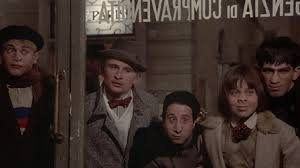 Federico Fellini's last masterwork, Amarcord (1973) provides an elaborate slice of Italian life. Drawing from Fellini's own childhood, it's funny, crude and poignant at once.
Federico Fellini's last masterwork, Amarcord (1973) provides an elaborate slice of Italian life. Drawing from Fellini's own childhood, it's funny, crude and poignant at once.Amarcord chronicles a year in Borgo San Giuliano, a fictional town on the Adriatic Sea, circa 1930. Loosely, the film focuses on Titta (Bruno Zanin), the teenaged son of foreman Aurelio (Armando Brancia) and Miranda (Pupello Maggio), as he and friends navigate the difficulties of school, church and adolescent lust. They're particularly enamored of town beauty Gradisca (Magali Noel), whose beauty and futile search for love intoxicate the villagers.
A series of broad vignettes, Amarcord can't easily be summarized. Fellini lingers on every day rituals, from an annual burning of a "winter witch" to snowfalls, funerals, film screenings and politics. An amiable attorney (Luigi Rossi) relates local lore and history to the viewer. Borgo San Giuliano seems like a perpetual party, inhabited by colorful characters obsessed with sex, prestige and pageantry. Life might seem empty and miserable if the town weren't so vibrant and colorful.
Fellini shows affection for his protagonists, especially the teenagers enraptured in callow fantasies. Yet Amarcord attacks Fascist Italy as stunting their growth. Teachers emphasize history and ancient languages, while priests seem obsessed with sex rather than absolution. Titta's parents do little but argue, showing little interest in their son. The movie's centerpiece is an elaborate fascist rally, interrupted by a fantasia of Mussolini's head marrying Ciccio (Fernando de Felice) and his dream girl, and a grammar phone blaring the Internationale.
 Even when mocking his characters, Fellini allows them humanity. Pompous Aurelio is the only townsperson who defies the Fascists, earning arrest and brutal interrogation. Biscein (Gennaro Ombra), a mischievous vendor, tells elaborate stories of his sexual prowess. A blind accordion player (Domenica Pertica) struggles to retain dignity amidst taunts by school children, and crackbrained Uncle Teo (Ciccio Ingrassa) climbs up a tree to escape taunts after he wets himself.
Even when mocking his characters, Fellini allows them humanity. Pompous Aurelio is the only townsperson who defies the Fascists, earning arrest and brutal interrogation. Biscein (Gennaro Ombra), a mischievous vendor, tells elaborate stories of his sexual prowess. A blind accordion player (Domenica Pertica) struggles to retain dignity amidst taunts by school children, and crackbrained Uncle Teo (Ciccio Ingrassa) climbs up a tree to escape taunts after he wets himself. Perhaps Fellini can be faulted for indulging in scatology. Amarcord literalizes its characters obsessions with jokes about farts, urination and masturbation, besides endless close-ups of female bottoms. Town strumpet Volpina (Josiane Tanzilli) staggers about begging for sex, while Tittio is nearly smothered in a comely tobacconist's (Maria Antonietta Beluzzi) breasts. Some will find Fellini's chauvinism repulsive, yet it reflects his callow, stunted characters who can't accept women as humans, preferring fantasy to truth.
Amarcord's tonal shifts can be jarring, alternating sex jokes and slapsticks with drama and tragedy. Angry Blackshirts take potshots at a bell tower, then torture Aurelio with castor oil. Miranda nags her husband and son, then becomes terminally ill, her demise genuinely heartbreaking. Even Gradisca, mesmerized by her own fantasies of romantic escape, proves poignant. Despite her physical glamor, her empty delusions earn our sympathy. She's no more deluded than her male counterparts, at least preferring love over baseness.
Even Fellini's best work veers between indulgence and self-criticism. For all its broad burlesque, Amarcord is honest and credible, showcasing its director's unique worldview. Small town life is a desperate burden, unless you make it into something grand.

